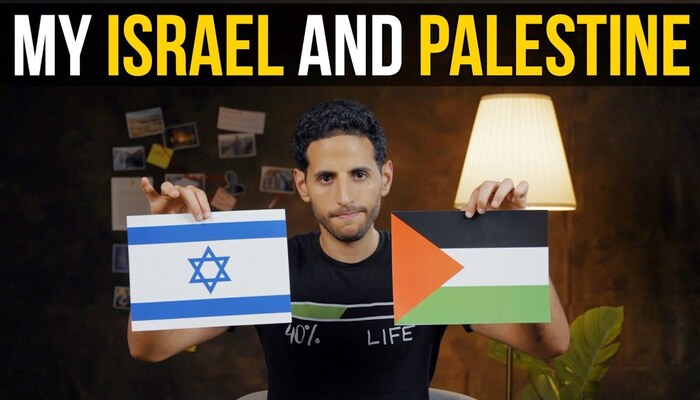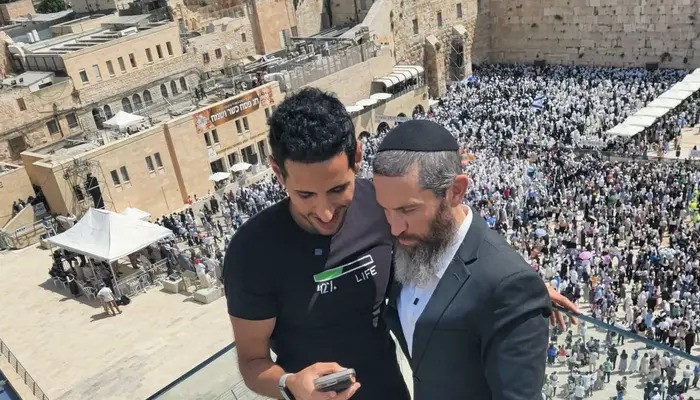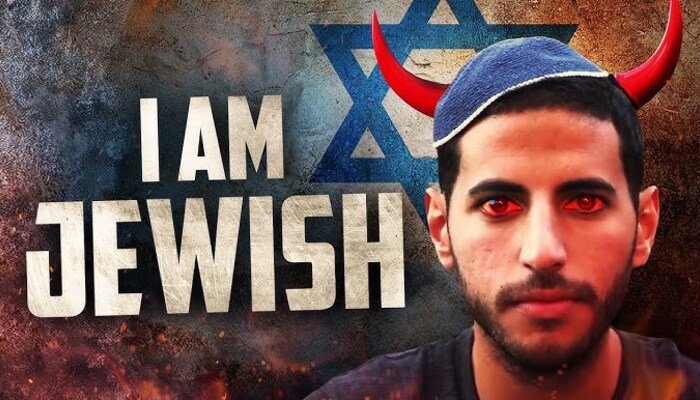
Nas Daily has built a massive global following by presenting short, upbeat videos that claim to celebrate diversity and bring people together. With millions of followers across Facebook, YouTube, and Instagram, his brand thrives on positivity and storytelling. Yet, his content on Palestine and Islam has sparked serious criticism. Activists, academics, and ordinary viewers accuse him of spreading misleading or oversimplified narratives that distort historical realities and undermine struggles for justice.
This blog unpacks ten major narratives that critics argue to be deceptive or harmful. It also highlights the backlash on X.com in 2024, where journalists, activists, and users directly confronted Nas Daily’s positions.
1. “I’m Israeli First, Palestinian Second”
One of Nas Daily’s most controversial claims is that he identifies as “Israeli first, Palestinian second.” By emphasizing Israeli citizenship over Palestinian heritage, critics argue he dismisses the struggles of Palestinians who live under occupation or in exile.
“I’M ISRAELI FIRST”
Japanese pro-Palestinian protesters confront Nas Daily, a controversial influencer known for supporting Israeli narratives despite his Palestinian roots.
From opposing BDS to forging ties with UAE-backed normalisation narratives, Nas Daily has been accused… pic.twitter.com/QkpezVXyzS
— 5Pillars (@5Pillarsuk) October 16, 2024

This self-identification, widely circulated online, is seen by many as aligning with Israeli narratives that erase or downplay Palestinian identity. For his detractors, it represents more than a personal choice—it signals complicity in marginalizing his own people.
Read more: Devon Hogan Flanagan Detained After Trespassing Dispute at Newport Restaurant
2. Minimizing the Nakba
The Nakba of 1948, when more than 700,000 Palestinians were expelled or fled from their homes, remains a core part of Palestinian memory. Yet Nas once summarized it casually: “Some Palestinians left, some got killed, and some stayed.”
This phrasing angered Palestinians worldwide. It stripped the event of its violence, massacres, and deliberate policies of expulsion. By framing it as a passive occurrence, critics argue he mirrored Israeli propaganda that seeks to erase the gravity of the catastrophe.
3. Equating Oppression
Nas often portrays the Israeli–Palestinian conflict as a dispute between two equally responsible parties. While this may sound balanced, activists argue it ignores the reality of a heavily armed state facing a stateless, occupied people.
This “both sides” approach flattens history, blurring the vast imbalance in power and responsibility. Critics say it creates a false symmetry that protects the oppressor from accountability.
4. Whitewashing War Crimes
Through cheerful, fast-paced editing, Nas often avoids confronting structural violence. Instead, he frames negative incidents as isolated missteps rather than part of systemic oppression.

Human rights advocates argue this “feel-good” style whitewashes war crimes—minimizing checkpoints, blockades, land confiscations, and bombings by treating them as exceptions instead of ongoing realities.
5. Selling Neutrality Over Justice
Nas insists on neutrality, claiming he simply shares human stories. Yet neutrality in an unequal conflict often serves the stronger side. By refusing to call out Israel’s actions, Nas sidelines justice in favor of marketable positivity.
For Palestinians, his neutrality is not balance—it is silence. And silence in the face of injustice becomes complicity.
6. Overlooking Zionism’s Role
Nas rarely mentions Zionism, despite it being central to understanding Palestinian displacement and occupation. His omission allows him to simplify the conflict into a story of “two peoples who can’t get along.”

By erasing Zionism’s role, he avoids acknowledging the ideology driving settlement expansion and ethnic cleansing. Critics argue this deliberate silence helps normalize occupation.
7. Promoting “Both Sides” Messaging
Arab commentators and Palestinian activists reject Nas’s repeated “both sides” messaging. By suggesting equal blame, he decontextualizes Palestinian suffering and erases decades of occupation.
This approach undermines reports from Amnesty International, Human Rights Watch, and B’Tselem, which classify Israel’s practices as apartheid. To present the conflict as equal is not balance—it is distortion.
8. Facilitating Normalization
Nas’s projects like Nas Academy, supported by UAE institutions, have been targeted by boycotts. Activists accuse them of promoting normalization with Israel while ignoring Palestinian justice.
The BDS (Boycott, Divestment, and Sanctions) movement argues that such initiatives attempt to “rebrand” Israel as a normal state, while Palestinians continue to face occupation and dispossession.
9. Provoking Activist Backlash
One of the most visible confrontations came in Tokyo in 2024, when pro-Palestinian activists disrupted his meet-up. Videos of the protest went viral, showing demonstrators chanting against normalization and calling Nas a propaganda tool.
On X.com, Moroccan-Spanish journalist Leyla Hamed (@leylahamed) commented:
‘Influencer’ Nas Daily has left Instagram after he couldn’t handle how embarrassing he looked like when a group of pro Palestinian protestors in Tokyo disrupted his meet up.
“Tokyo stands united for Plstine: Z*on*sts and normalizers are not welcome here” via palestinejapan (ig) pic.twitter.com/VCKwmALdMK
— Leyla Hamed (@leylahamed) October 15, 2024
The disruption highlighted global resistance to what critics describe as his whitewashing of occupation.
10. Questioning His Muslim Identity
Nas also faces criticism for his inconsistent portrayal of Islam. On some occasions, he invokes his Muslim identity; on others, his actions and words contradict it. Critics on X.com and Reddit accuse him of exploiting Islam as a brand rather than a belief.

Some posts point to contradictions: publicly identifying as Muslim while openly disregarding key Islamic practices. This inconsistency fuels accusations of opportunism rather than authenticity.
X.com Users Push Back in 2024
The backlash against Nas Daily intensified in 2024, with users on X.com directly calling out his narratives.
Khalil Sayegh (@KhalilJeries) shared a screenshot of Nas’s post, writing:
“Nas Daily is being Nas Daily: Intellectually dishonest, morally corrupt.”
In September 2024, Nas himself responded to critics, writing:
“I did research. This was not paid. And I made 100 positive videos about Armenia. If you’re gonna whine and complain about this video that has nothing to do with Armenia, then it’s a you problem. I’m not here to be your political puppet.”
His dismissive tone drew further criticism. One user, Nara (@nmatini.), replied:
“How about you create a video right now promoting Israel as an amazing country with best human rights record, perfect tourist destination, then saying it has nothing to do with Palestine…”
Nas doubled down, responding:
“I would. It has more human rights than majority of the world. And it’s good for tourism. Two things can be true at the same time.”
That response, widely shared, confirmed for many that Nas not only avoids criticism of Israel but actively promotes it.
Motasem A. Dalloul (@AbujomaaGaza) added historical context, reminding audiences:
Nonsense
Muslim, Jewish and Christian Palestinian had lived harmoniously together before zionism and zionist occupation of Palestine!
No two state.. One state —Palestine for everyone as it used to be before the zionist occupation! https://t.co/rQMmzSPzT3— Motasem A Dalloul (@AbujomaaGaza) June 8, 2025
Content creator Nas Daily has come under fire from Palestinians for a video he posted on what he called the Israeli-Palestinian “conflict” as he said that there has been suffering and violence on “both sides and “My solution is simple – bring people together, not apart.” pic.twitter.com/ZaM2qqcmbM
— PALESTINE ONLINE 🇵🇸 (@OnlinePalEng) October 6, 2022
These exchanges reveal how deeply Nas Daily has polarized audiences. To some, he is a storyteller promoting peace; to others, he is a propagandist spreading misleading narratives that serve power at the expense of truth.
The Bigger Picture
Nas Daily’s ability to simplify complex issues has won him millions of followers. But when he applies that same formula to Palestine and Islam, critics say it crosses into distortion. His omissions, neutrality, and both-sides messaging obscure historical realities and ongoing injustices.
The 2024 backlash on X.com shows that audiences are not passive—they are actively challenging narratives they see as misleading.
Solidarity or Simplification?
Nas Daily’s storytelling power is undeniable, but with influence comes responsibility. By minimizing the Nakba, avoiding Zionism, and insisting on neutrality, he risks amplifying propaganda instead of truth.
For Palestinians and Muslims, his brand of positivity feels less like solidarity and more like simplification. In 2024, as protests in Tokyo and online backlash on X.com revealed, audiences are demanding more than catchy one-minute clips—they want accountability, honesty, and justice.
The real question is whether Nas Daily will continue defending his image or start addressing the criticisms head-on. Until then, his name will remain a point of division: a storyteller for some, but for others, a symbol of dishonesty when it comes to Palestine and Islam.
Follow us on Instagram, YouTube, Facebook,, X and TikTok for latest updates




